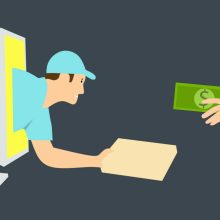Shares|ShareTweetHarnessing Lunar Energy: A Reader’s Journey with “Moon Phases for Success” by Manu Minocha – A Book Review “Moon Phases for Success” by Manu Minocha offers a deep insight into transformative approach to harnessing lunar energy for personal and professional growth. As a reader seeking to benefit from moon phases, I found this book to be an invaluable guide to helping me aligning my life; personal, work & financial, with natural cycles. Minocha’s insights on using lunar cycles for abundance and productivity were eye-opening. The book concise to the point without any confusion and provides practical strategies for each moon…
The Mortgage Application Process: A Comprehensive Guide

If you’re thinking about buying a home, you’re likely to need a mortgage. Mortgages are a way for people to finance the purchase of a home, and they’re an essential part of the home buying process. However, the mortgage application process can be complicated and confusing, especially for first-time homebuyers. In this article, we’ll take you through the steps of the mortgage application process and what you can expect along the way.
When you’re ready to buy a home, one of the first steps is to secure a mortgage. The mortgage application process can be complex, and there are several factors that lenders consider when determining whether to approve your application. In this article, we’ll walk you through the mortgage application process and provide tips for making the process as smooth as possible.
1. Preparing for Your Mortgage Application
Before you apply for a mortgage, it’s important to take some time to prepare. This will help ensure that you have everything you need to complete the application and increase your chances of being approved.
Know Your Credit Score
Your credit score is one of the most important factors that lenders consider when reviewing your mortgage application. Before you apply for a mortgage, it’s a good idea to check your credit score and take steps to improve it if necessary.
Get Your Finances in Order
Lenders will also review your income and expenses to determine whether you can afford to make mortgage payments. Before you apply for a mortgage, take a close look at your finances to make sure that you’re in good financial standing.
Save for a Down Payment
Many lenders require a down payment on a mortgage, typically around 20% of the purchase price. Before you apply for a mortgage, make sure that you have enough saved up to cover the down payment and any closing costs.
2. Applying for Your Mortgage
Once you’re ready to apply for a mortgage, you’ll need to choose a lender and fill out an application. Here’s what you can expect during the application process.
Choose a Lender
There are many lenders to choose from, including banks, credit unions, and online lenders. Research different lenders to find one that offers the best rates and terms for your financial situation.
Fill Out the Application
The mortgage application will ask for detailed information about your financial situation, including your income, employment history, and credit score. Be prepared to provide documentation to support your application, such as tax returns and bank statements.
Pay for the Appraisal and Credit Check
The lender will require an appraisal of the home you’re purchasing to ensure that it’s worth the amount of the loan. You’ll also need to pay for a credit check, which will verify your credit score and financial history.
3. Documentation and Requirements
During the mortgage application process, you’ll need to provide several types of documentation to support your application. Here are some of the most common requirements.
Income Verification
You’ll need to provide documentation of your income, including tax returns, W-2 forms, and pay stubs. This will help the lender determine whether you can afford the monthly mortgage payments.
Employment Verification
The lender will also want to verify your employment history to ensure that you have a stable source of income. This may include contacting your employer.
Credit Score and Credit Report
Your credit score and credit report are crucial factors that lenders consider when reviewing your mortgage application. You’ll need to provide documentation of your credit score and credit report, which can be obtained from credit bureaus such as Equifax, Experian, or TransUnion.
Assets and Liabilities
You’ll need to provide information on your assets and liabilities, including bank statements, investment account statements, and information on any outstanding debts or loans.
4. Mortgage Approval and Closing
Once you’ve submitted your mortgage application and provided all the necessary documentation, the lender will review your application and make a decision on whether to approve your mortgage. Here’s what you can expect during this process.
Underwriting
The lender will review your application and all the supporting documentation to determine whether you’re a good candidate for a mortgage. This process is known as underwriting.
Mortgage Approval
If your application is approved, the lender will provide you with a mortgage commitment letter. This letter outlines the terms of the mortgage, including the interest rate and monthly payment.
Closing
The final step in the mortgage application process is closing. This is where you sign all the necessary paperwork and officially take ownership of the home. During the closing process, you’ll need to pay any closing costs and make a down payment on the mortgage.
5. Common Mortgage Application Mistakes
Applying for a mortgage can be a complicated process, and there are several common mistakes that you’ll want to avoid. Here are some of the most common mistakes that homebuyers make during the mortgage application process.
Not Checking Your Credit Score
Your credit score is one of the most important factors that lenders consider when reviewing your mortgage application. Make sure you know your credit score before applying for a mortgage.
Making Big Purchases Before Closing
Avoid making big purchases or taking on new debts before closing on your mortgage. This can affect your credit score and your ability to qualify for the mortgage.
Not Saving Enough for Closing Costs
Closing costs can add up quickly, so make sure you have enough saved up to cover these costs.
6. Tips for a Smooth Mortgage Application Process
While the mortgage application process can be complex, there are several things you can do to make the process smoother and increase your chances of being approved for a mortgage. Here are some tips to keep in mind.
Get Preapproved for a Mortgage
Getting preapproved for a mortgage can make the application process smoother and give you a better idea of how much you can afford to spend on a home.
Stay Organized
Keep all your documentation organized and in one place to make the application process smoother.
Work with a Professional
Working with a mortgage professional can help you navigate the application process and increase your chances of being approved for a mortgage.
Conclusion
The mortgage application process can be complex, but with the right preparation and knowledge, you can increase your chances of being approved for a mortgage. By understanding the requirements and documentation needed, as well as common mistakes to avoid, you can make the process smoother and less stressful.
FAQs
What documents are needed for a mortgage application?
You’ll need to provide documentation of your income, employment history, credit score and report, assets and liabilities, and any outstanding debts or loans.
How long does the mortgage application process take?
The mortgage application process can take anywhere from several weeks to several months, depending on the lender and the complexity of your financial situation.
What is the difference between preapproval and prequalification?
Prequalification is an informal process where the lender provides an estimate of how much you can afford to borrow based on the information you provide. Preapproval is a more formal process where the lender evaluates your creditworthiness and provides a commitment letter outlining the terms of the mortgage.
Can I apply for a mortgage if I have a low credit score?
Yes, you can still apply for a mortgage with a low credit score, but it may be more difficult to qualify for a mortgage or you may be required to pay a higher interest rate.
What should I do if my mortgage application is denied?
If your mortgage application is denied, you can ask the lender for the reason why and work to improve your financial situation before reapplying. You may also want to consider working with a different lender or seeking assistance from a mortgage professional.
Can I apply for a mortgage if I’m self-employed?
Yes, self-employed individuals can apply for a mortgage, but they may be required to provide additional documentation to prove their income and creditworthiness.
How much of a down payment do I need to make on a mortgage?
The down payment amount required for a mortgage can vary depending on the lender and the type of mortgage. Generally, a down payment of 20% of the home’s purchase price is recommended to avoid paying private mortgage insurance (PMI), but some lenders may offer loans with a smaller down payment requirement.
In conclusion, applying for a mortgage can be a complex and time-consuming process, but with the right knowledge and preparation, you can increase your chances of being approved for a mortgage. It’s important to understand the documentation and requirements needed, as well as common mistakes to avoid. Working with a professional and staying organized can also help make the process smoother and less stressful. Remember, owning a home can be a great investment and a source of pride, so don’t be discouraged by the application process. With patience and diligence, you can make your homeownership dreams a reality.
About Author/s: The article is intended to offer information regarding ways to make money online. Based on available information regarding the field of online jobs and income opportunities, the authors have compiled a comprehensive list and information of the best ways to make money online. Content of this article is provided for informational purposes only. We hope that this article “The Mortgage Application Process: A Comprehensive Guide ” will be useful to readers who are looking for ways to earn income from the comfort of their own home to do their due diligence in determining best money-making options for them.
Types of Mortgages: Exploring the Options Available in the Market









Pingback: Types of Mortgages: Exploring the Options Available in the Market